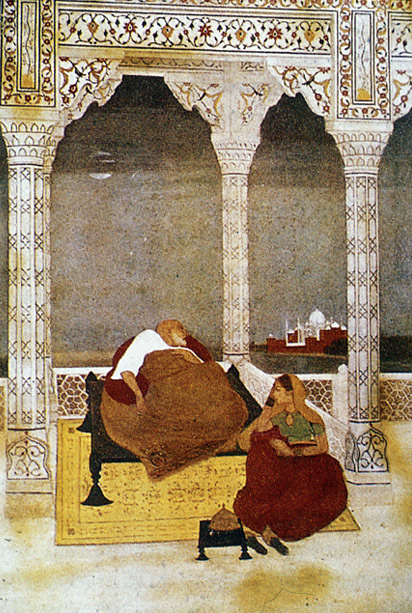FWP:
SETS == IDIOMS; MUSHAIRAH
For more on har-chand , see {59,7}.
This is a smashingly in-your-face mushairah verse in its structure. The first line is set up in a way that positively forces us to misread it. For 'faithfulness' [vafaa] is feminine, and the feminine singular verb 'kept on going' [jaatii rahii] not only agrees with it, but also makes for a perfect semantic fit, for naturally the progressive departure of 'faithfulness' would seem indeed to be a case of 'cruelty/injustice' [bedaad].
Not until-- after a delay, of course, under mushairah performance conditions-- we've finally been vouchsafed the second line, can we perceive that the feminine singular thing that 'kept on going' was not faithfulness after all, but the speaker's 'life' [mirii jaan]. And the only way we can perceive this, or indeed make sense of the second line at all, is by recognizing the wonderfully evoked idiom jaan bah lab honaa , 'for the life to be on the lips', meaning for one to be on the verge of dying. Even then, we recognize the phrase only by implication, since the idiom on which the whole verse rests is nowhere present in the verse itself.
As Faruqi observes, the (Persianized) idiom 'for the life to be with the lip'
has here been construed as a relationship, and thus one that must be given
up for the sake of strict 'faithfulness' to the beloved. The 'life' must abandon its longtime companion, the 'lip', even as the
lover must abandon his life. Both, in the name of 'faithfulness', are practicing
a 'cruelty' or 'injustice'; the verse exclaims at it, calls our attention
to it-- perhaps reproachfully, but perhaps with a reluctant (or even unreluctant)
admiration.

Nazm:
Although my life was very familiar with my lips-- that is, my life always remained on my lips-- as faithfulness departed, it kept going away, and left behind such familiar and beloved companions as the lips. (144)
== Nazm page 144